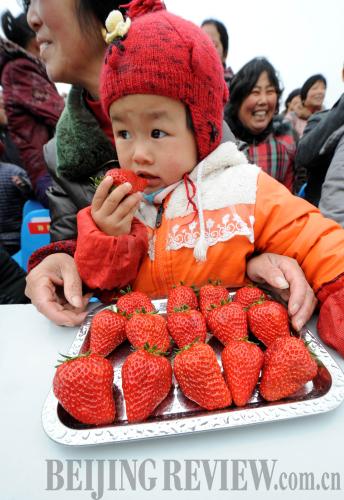|
 |
|
TASTY FRUIT: A child eats strawberries at the opening of an agricultural event in Lishui District in Nanjing, Jiangsu Province, on March 8 (SUN CAN) |
Elderly Homes
Chinese authorities published a regulation on March 12 encouraging homes for the elderly to insure against risks in their services.
The regulation, jointly issued by the Ministry of Civil Affairs, the China Insurance Regulatory Commission and the China National Committee on Aging, pledged to promote liability insurance in the country's nursing homes and create a risk-pooling mechanism in the sector.
It will also help nursing homes strengthen their sense of responsibility as well as their internal management, better protecting senior citizens' rights and interests, it said.
According to the document, a floating premium rate system should be adopted to encourage the insured institutions to work hard in risk prevention.
Moreover, the regulation said, allowances for the premium fees meted out by financial authorities as well as relevant costs of government-sponsored nursing homes will be earmarked in the public budget.
Prior to the regulation, insurance projects for elderly care homes had already been launched in several Chinese regions including Beijing, Shanghai and Guangdong.
Green Island
China's experiment in developing a green economy on Chongming Island in east China's Shanghai has been recognized by the United Nations Environment Programme (UNEP) as a recommended model of green economic development.
The UNEP published its evaluation report on the ecological status of Chongming on March 10. The island is the world's largest alluvial island and the least developed district of Shanghai.
Covering an area of 1,267 square km, Chongming was approved as a national development zone for sustainable development in 2010, and the UNEP was invited by the Chinese Government to evaluate the eco-island construction project.
Development on the island, which has a population of around 600,000, has effectively integrated social, environmental and economic perspectives, according to the UNEP's evaluation.
The UNEP suggested that the Chongming model be promoted in China as an example in developing a green economy for less developed regions.
Organ Donation
China has set up a special committee to supervise organ donations and transplants, the health authority announced on March 7.
Jointly founded by the National Health and Family Planning Commission (NHFPC) and the Red Cross Society of China (RCSC), the new committee is the result of a merger of the Organ Transplant Committee and the China Organ Donation Committee, the NHFPC revealed in a statement.
The committee will be in charge of coordinating and guiding different systems including donation acquiring and distributing, clinical transplant services, postoperative registration, and transplant supervision.
China has the world's second-largest demand for organ transplants. About 300,000 patients suffer from organ failure each year, but only around 10,000 organ transplants are performed due to a lack of donors.
The country introduced an organ donation system in 2010, with the non-governmental RCSC serving as an independent third party for supervising and facilitating donation procedures.
| 